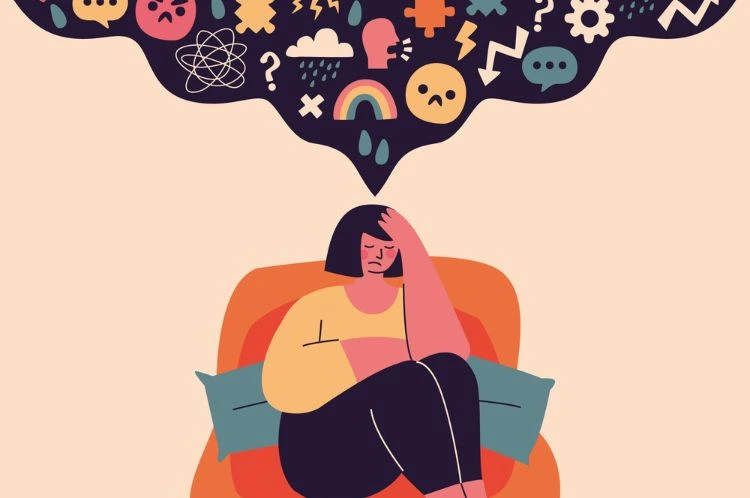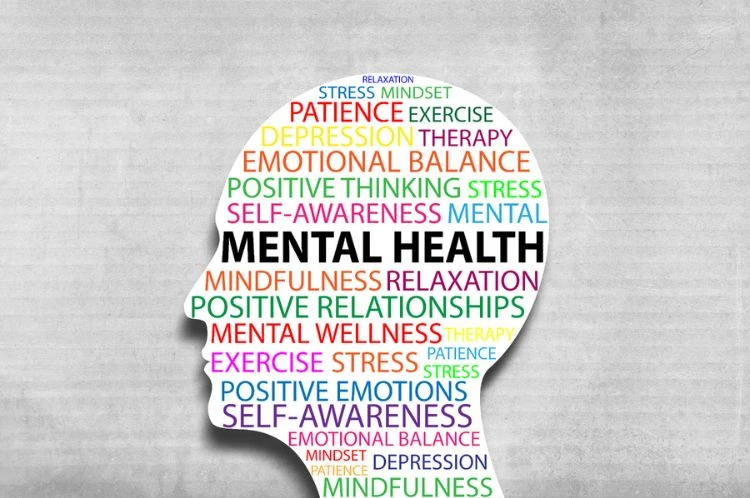A 2021 study found that approximately 23% of adults in the USA experienced symptoms of mental illness. Our mental health is often overlooked in pursuit of success, productivity, and relationships.
For us to lead a fulfilling life, form meaningful relationships, pursue our goals, and enjoy everyday experiences, our mental health is as important as our physical health.
To anyone reading this: if you’re struggling, remember, you are not alone; there are millions of people fighting these invisible battles of the mind. While the journey is not linear, it’s worth fighting. You deserve to feel whole, and you have the strength to get there.
In this blog, we will talk about poor mental health and provide practical tips to win these invincible battles of the mind. Let’s embark on the journey of self-improvement.
Why is Poor Mental Health Harmful?

Poor mental health or mental health issues doesn’t just impact the mind; it ripples into every aspect of your life. Left unaddressed, it can manifest in ways that affect your physical, emotional, and social well-being. Here’s how:
Physical Health Consequences
The first thing that you need to understand is that your body and mind are not separate entities; therefore, your poor mental health will manifest into poor physical health as well.
For example, it is observed that people suffering from depression might suffer from headaches, fatigue, and digestive problems. Similarly, people with anxiety can suffer from insomnia and restlessness.
Untreated mental health conditions can lead to weakened immunity and even long-term health issues such as heart disease or diabetes.
Cognitive Impairment
An individual suffering from mental health issues can often find it challenging to think clearly, make decisions, and focus, leading to significant cognitive impairment. This can lead to difficulty in concentrating.
For example, tasks that once seemed simple and straightforward can become challenging, leading to frustration.
Individuals can also face memory problems, making it hard for them to remember important dates, appointments, or details, which disrupts daily routines and adds to stress.
Emotional and Social Strain:
When your mind feels heavy, maintaining relationships and social interactions can feel like a chore, leading to emotional and social strain. The effort required to engage with others becomes overwhelming, often resulting in withdrawal and isolation. This isolation can further lead to feelings of loneliness and sadness, creating a vicious cycle that makes it even harder to reach out for support.
If these realities resonate with you, know that acknowledging the challenge is the first step toward healing.
Common Mental Illnesses by Age Group
Mental health issues can affect people of all ages, though their prevalence and nature often vary. Below is a brief overview of common mental illnesses by age group:
| Age Group |
Most Common Mental Illness |
Examples |
| Children (5-12) | Anxiety Disorders | Generalized Anxiety Disorder, Phobias |
| Teenagers (13-19) | Depression and Eating Disorders | Major Depressive Disorder, Anorexia, Bipolar Disorder |
| Young Adults (20-35) | Anxiety Disorders and Depression | Social Anxiety, PTSD, Panic Disorder |
| Adults (36-59) | Stress-Related Disorders | Burnout, Chronic Stress, Adjustment Disorders |
| Seniors (60+) | Dementia and Depression | Alzheimer’s, Late-Onset Depression |
These statistics are not just numbers; they reflect real lives, often impacted silently. But with awareness and action, healing is always possible.
Tips to Prioritize Your Psychological Wellness

Healing and strengthening your mental health is a deeply personal journey, but there are some universally effective steps you can take to nurture your psychological well-being:
1. Focus on Yourself
Let’s clarify this: FOCUSING on yourself does not mean being SELFISH. The first step to improve your mental wellbeing is to improve yourself first. This can mean different things for different individuals. For some, it can be engaging in meaningful self-care, while for others, it can be trying a balanced lifestyle.
How can you focus on yourself?
- Set boundaries
- Practice gratitude.
- Try new skills or hobbies.
- Focus on self-care.
2. Reduce Tobacco and Drug Consumption
Tobacco and drugs are known for creating a state of trance that can reduce stress and anxiety. However, relying on these dangerous items can cause addiction, which can worsen your mental health in the longer run. Consumption of tobacco and drugs can lead to anxiety and depression and affect brain development.
How to reduce tobacco and drug consumption:
- Try Nicotine Replacement Therapy.
- Hit the gym or do physical activities.
- Don’t visit places associated with smoking or drugs.
- Join a stop smoking program.
Reading success stories of people who have successfully stopped smoking can also help you in this journey of quitting and embarking the new journey of psychological wellness.
3. Socialize
Human connection is one of the most powerful tools for mental health. Surround yourself with people who love, uplift, and understand you. Even a simple conversation with a friend or family member can act as a soothing medicine for a heavy heart. The book ‘Ikigai – Japanese secret to a long and happy life’ talks highly of socializing with friends and neighbors to improve your life expectancy.
How can you socialize?
- Visit your parents house (if you live in the same city).
- Plan trips with your close friends.
- Participate in classes such as dancing or cooking.
- Plan lunch with colleagues.
4. Express Gratitude
Your current life might be someone’s dream life; therefore, being grateful is important. Remember that gratitude can lead to a more positive outlook on life and increased overall happiness.
Start your day by remembering three things you are grateful for, and before sleeping, reflect on three things you were grateful for that day. Over time, this simple practice can shift your perspective and make life’s challenges feel more manageable.
You can also buy a gratitude journal and note down your blessings and things that you are grateful for.
5. Practice Meditation and Relaxation Techniques
Meditation is more than just a wellness trend—it’s a scientifically backed way to reduce anxiety and improve focus. Even five minutes of deep breathing or guided relaxation can anchor you in the present moment and calm a racing mind. If done consistently over a period of years, meditation can:
- Improve your focus
- Sharpen your senses
- Make you resilient to stress.
How to start your meditation journey
- Start with guided meditation to avoid losing yourself in your thoughts.
- Join online meditation classes.
- Once you understand the basics of meditation through experts, start meditating without any guidance.
- Use earbuds to nullify outside noise.
Don’t worry if you can’t concentrate; meditation is a very difficult skill to master, and it takes years and years of practice to master the technique. However, you don’t need to perfect meditation to reap its benefits. Slow breathing and being mindful can also be helpful to reduce stress and anxiety.
6. Practice Forgiveness
Holding onto grudges is like carrying someone’s weight. Practicing forgiveness—whether toward others or yourself—can free your mind from negativity and create space for peace and healing. Forgiveness is not about excusing the behavior of others but rather about releasing yourself from the burden of anger and resentment. It allows you to move forward with a lighter heart and a clearer mind.
7. Take a Stroll in Nature
Whether you are a mountain person or a beach person, a 10-min walk surrounded by Mother Nature can heal you. Fresh air, sunlight, and greenery can reduce the production of stress hormones and increase the release of endorphins that reduce anxiety and clear mental clutter.
8. Engage in Physical Activities
Physical activities like working out, sports, dancing, or simple jogging are directly linked with improving your mental health. Physical activities can improve your mental health by releasing endorphins that naturally lift your mood and reduce stress.
If these tips prove to be ineffective, you can always consult a mental health therapist who can provide you with the right medications to improve your condition.
Types of physical activities
You Are Not Alone
One of the most painful aspects of mental illness is the sense of isolation it often brings. But let me assure you: you are never truly alone. Millions of people face similar challenges, and many have found ways to heal and thrive.
Healing takes time, and it’s okay to move at your own pace. Celebrate small victories, seek support when you need it, and remember that no feeling—no matter how overwhelming—is permanent.
There is always hope, always light, and always a path forward.
Final Thoughts
Prioritizing your mental health is not a luxury; it’s a necessity. The steps shared here are not quick fixes but foundational practices to nurture your psychological well-being over time.
To anyone who feels lost or burdened, you are stronger than you think. The fact that you are reading this means you’ve already taken the first step toward a healthier, happier you. Be patient with yourself, lean into your support systems, and never hesitate to seek help if you need it.
The journey to mental wellness is challenging but deeply rewarding. You are worth the effort, and brighter days are ahead.
Visit Stay Fit Stay Healthy to learn more about physical and mental health, diet plans, and other fitness-related blogs.

